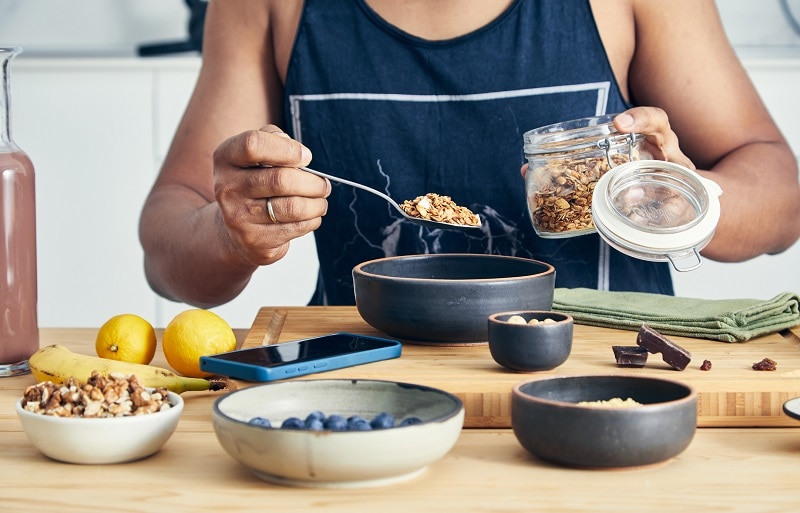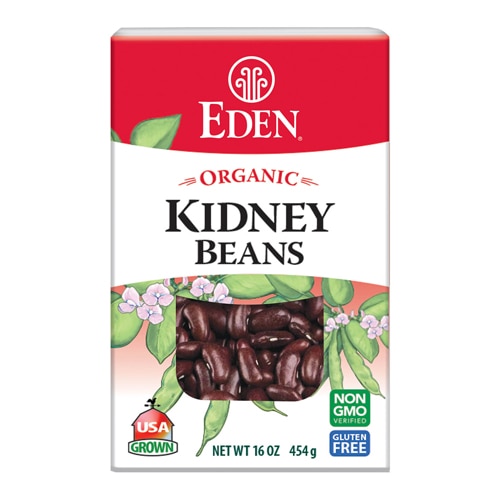[vc_row][vc_column][vc_column_text]Somedays we have all the energy in the world and other days it seems like it’s in short supply. Maybe your battery is drained from an especially busy time or you’re just not getting enough sleep. No matter the case, everyone can use ideas on how to boost energy.
Energy levels can be affected by many things, including sleep and mental health. Where does the body get energy? The simple answer is FOOD. Nutrients like carbohydrates, fat and protein give the body energy and fuel the brain, heart, liver, GI tract and more.
When fueling your body, it’s important to be mindful. The foods we eat impact our energy levels. Listening to your body’s cues can help you get to a peaceful place with food. Let’s dive into which foods can impact energy levels.

What Foods Give You Energy
As mentioned earlier, carbohydrates, fat and protein are key to supplying our body with the energy it needs to function.
Carbohydrates: Carbohydrates are the main and preferred source of energy in the body, converting carbohydrates to glucose and then to energy. The body typically has smaller stores of carbohydrates, which is why you need to include these foods daily.
Noteworthy carbohydrates that provide sustained energy include fiber and micronutrients, such as whole grains (like
oats, bread,
barley,
quinoa,
pasta,
farro and
rice), legumes (
lentils,
black beans,
chickpeas,
green peas,
black-eyed peas,
lima beans,
peanuts and
kidney beans), fruit (berries,
bananas, kiwi, mangos,
apples, pears, oranges,
peaches, plums, watermelon and cantaloupe) and starchy vegetables (red potatoes, sweet potatoes, peas,
corn, seasonal squash and white potatoes).
Fat: Fat is also a great fuel source, secondary to carbohydrates. Fats are not only beneficial for the heart, but it’s needed to help absorb fat soluble vitamins –
vitamin A, E, D, and K.
When focusing on fats, it is important to include
heart healthy fats throughout the day, including
nuts and seeds (
pumpkin seeds,
hemp seeds,
pistachios,
walnuts,
almonds,
pecans,
sunflower seeds,
chia seeds,
flaxseeds and
cashews),
seafood (
tuna,
sardines,
salmon, cod, orange roughy,
mackerel, herring and lake trout), avocados and
oils (
olive, canola, safflower,
avocado, peanut and
sesame oil).
Protein: Protein’s role in the body varies from being broken down into amino acids to provide cells fuel, to aiding in rebuilding muscles. Protein is typically broken down at a slower rate than carbohydrates, making it an important fuel for the body, although not the preferred energy source. When incorporating protein, it is important to focus on variety and to include an array of nutrients from plant (
beans,
nuts, seeds,
tofu,
quinoa,
nutritional yeast and sprouted bread) and animal products (chicken, beef, seafood, turkey, pork, duck, lamb, dairy foods and eggs).
Foods that may negatively impact energy
Not all foods bring the same type of energy to our bodies, but learning how to pair them with other foods can help to find the balance for nutrition needs. All bodies are wonderfully unique; therefore, all foods may impact everyone’s body a little differently.
Refined sugar: Let’s start by including a myth buster first. It is OK to eat refined sugar. Refined sugar refers to added sugar (which can be seen on a food label). These include cane sugar, syrups, high-fructose corn syrup, honey, maple syrup and malt sugar.
The negative impact of eating refined sugar comes when eating it on its own, which provides a short burst of energy, but it won’t last long. To provide added sugar with more staying power, it is important to pair this with another macronutrient like a heart healthy fat or protein. Incorporating more than one food group or macronutrient will help with this. When including refined sugar, focus on individualized needs and the meaning behind that food choice.
Not enough calories: Eating too few calories with meals or snacks can also have a negative effect on energy levels. The body needs calories to function – when we are not fueling it with enough calories, the body will choose which parts or organs to give the energy to. This is why it is important to eat enough calories and macronutrients throughout the day – to fuel our bodies fully. A nutrition professional can help you determine your individualized needs.
How to eat to support energy
Foods that support our energy are just that, foods – plural. Focus on including a variety of macronutrients and look for a beneficial balance for individualized needs. Let’s break it down into meals and snacks.
Meals: Incorporating three of the five foods groups ensures the meal is balanced. For a refresher, food groups may include grains, protein, fruit, vegetables, and dairy. Since we are discussing macronutrients, including one of each
macronutrient will also help ensure a balanced meal.
This can look like:
- Whole grain waffle with peanut butter, hemp seeds and raspberries
- Turkey sandwich on whole grain bread with Greek yogurt, and an apple
- Salmon with roasted asparagus, and a sweet potato
Snacks: When balancing snacks, including two of the five food groups or at least two macronutrients, will build a balanced, nutrient dense snack.
This can look like:
- A banana and peanut butter
- Avocado and cottage cheese
- Hummus with carrots and sugar snap peas
Challenge yourself by making your own personal lists of favorite foods in each macronutrient category – carbohydrates, proteins and fat containing foods. Then choose two items (one from each list) when having a snack and three items (one from each list) when enjoying a meal.
There is always going to be a new trendy food product out there claiming to increase energy, but always remember to read between the lines. The true source of energy is simple – nourishing food! To learn more, meet with a Kroger registered dietitian online by scheduling a
Telenutrition appointment.[/vc_column_text][/vc_column][/vc_row][vc_row][vc_column][vc_text_separator title="Featured Products" border_width="2"][vc_row_inner equal_height="yes" content_placement="middle" gap="35"][vc_column_inner width="1/3"][vc_single_image image="172735" img_size="full" alignment="center" onclick="custom_link" img_link_target="_blank" css=".vc_custom_1707258512895{padding-right: 7% !important;padding-left: 7% !important;}" link="https://www.vitacost.com/crispy-green-non-gmo-crispy-fruit-4-pack-all-apple"][/vc_column_inner][vc_column_inner width="1/3"][vc_single_image image="172736" img_size="full" alignment="center" onclick="custom_link" img_link_target="_blank" css=".vc_custom_1707258530668{padding-right: 7% !important;padding-left: 7% !important;}" link="https://www.vitacost.com/cucina-amore-nut-free-farro-quick-meal-artichoke-lemon-roasted-garlic"][/vc_column_inner][vc_column_inner width="1/3"][vc_single_image image="172737" img_size="full" alignment="center" onclick="custom_link" img_link_target="_blank" css=".vc_custom_1707258549182{padding-right: 7% !important;padding-left: 7% !important;}" link="https://www.vitacost.com/simple-truth-nut-butter-bites-apple-pie-walnut"][/vc_column_inner][/vc_row_inner][/vc_column][/vc_row]




